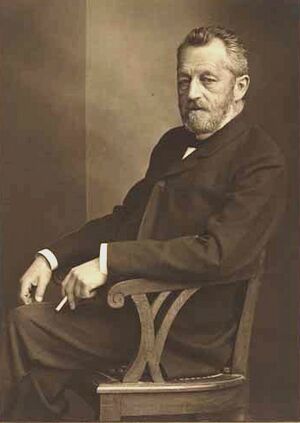Max Erdmannsdörfer: Difference between revisions
m (1 revision imported) |
|||
| (5 intermediate revisions by 2 users not shown) | |||
| Line 1: | Line 1: | ||
{{picture|file=Max Erdmannsdörfer.jpg|caption='''Max Erdmannsdörfer''' (1848-1905)}} | {{picture|file=Max Erdmannsdörfer.jpg|caption='''Max Erdmannsdörfer''' (1848-1905)}} | ||
German conductor, pianist and composer (b. 14 June 1848 in [[Nuremberg]]; d. 14 February 1905 in [[Munich]]). | German conductor, pianist and composer (b. 14 June 1848 {{NS}} in [[Nuremberg]]; d. 14 February 1905 {{NS}} in [[Munich]]). | ||
==Tchaikovsky and Erdmannsdörfer== | ==Tchaikovsky and Erdmannsdörfer== | ||
After studying at the [[Leipzig]] Conservatory, Erdmannsdörfer became concertmaster at Sonderhausen. In 1882 he became the principal conductor of the Russian Musical Society concerts in [[Moscow]] | After studying at the [[Leipzig]] Conservatory, Erdmannsdörfer became concertmaster at Sonderhausen. In 1882, he became the principal conductor of the Russian Musical Society concerts in [[Moscow]] and professor at the [[Moscow]] Conservatory. Tchaikovsky considered him to be "a very skillful, experienced and expert conductor", although he was "inclined to indulge the public's taste of exaggerated nuances" and "offhanded in his attitude to Russian music (except my own)" <ref name="note1"/>. | ||
In 1874 he married the pianist and composer [[Pauline Fichtner]] (b. Oprawill, 1847–1916). | In 1874, he married the pianist and composer [[Pauline Fichtner]] (b. Oprawill, 1847–1916). | ||
The list of Tchaikovsky's works premiered by Erdmannsdörfer includes the [[Symphony No. 1]] (revised version, 1883), [[Suite No. 2]] (1884), [[Concert Fantasia]] (1885), and the symphony ''[[Manfred]]'' (1886), The composer valued Erdmannsdörfer's arrangement of his ''Chant sans paroles'' (No. 3 from ''[[Souvenir de Hapsal]]'', Op. 2) so highly that Tchaikovsky conducted it himself in 1892. | The list of Tchaikovsky's works premiered by Erdmannsdörfer includes the [[Symphony No. 1]] (revised version, 1883), [[Suite No. 2]] (1884), [[Concert Fantasia]] (1885), and the symphony ''[[Manfred]]'' (1886), The composer valued Erdmannsdörfer's arrangement of his ''Chant sans paroles'' (No. 3 from ''[[Souvenir de Hapsal]]'', Op. 2) so highly that Tchaikovsky conducted it himself in 1892. | ||
==Dedications== | ==Dedications== | ||
In 1884 Tchaikovsky dedicated his [[Suite No. 3]] in G major, Op. 55 (1884) | In 1884, Tchaikovsky dedicated his [[Suite No. 3]] in G major, Op. 55 (1884) "À Monsieur Max Erdmannsdoerfer", to make amends for missing the premiere of his [[Suite No. 2]], which had taken place earlier that year under Erdmannsdörfer's direction <ref name="note2"/>. | ||
==Correspondence with Tchaikovsky== | ==Correspondence with Tchaikovsky== | ||
| Line 17: | Line 17: | ||
* '''[[Letter 3139a]]''' – 1886–1888, from [[Moscow]] | * '''[[Letter 3139a]]''' – 1886–1888, from [[Moscow]] | ||
3 letters from Erdmannsdörfer to the composer, | 3 letters from Erdmannsdörfer to the composer, dating from 1886 and 1888, are preserved in the {{RUS-KLč}} at [[Klin]] (a{{sup|4}}, Nos. 6012–6014). | ||
==Bibliography== | ==Bibliography== | ||
| Line 23: | Line 23: | ||
* {{bib|2006/13}} (2006) | * {{bib|2006/13}} (2006) | ||
* {{bib|2007/7}} (2007) | * {{bib|2007/7}} (2007) | ||
==External Links== | |||
* [[wikipedia:Max_Erdmannsdörfer|Wikipedia]] | |||
* {{IMSLP|Erdmannsdörfer,_Max}} | |||
* {{viaf|45056664}} | |||
==Notes and References== | ==Notes and References== | ||
| Line 34: | Line 39: | ||
[[Category:Correspondents|Erdmannsdorfer, Max]] | [[Category:Correspondents|Erdmannsdorfer, Max]] | ||
[[Category:Dedicatees|Erdmannsdorfer, Max]] | [[Category:Dedicatees|Erdmannsdorfer, Max]] | ||
__NOTOC__ | |||
Latest revision as of 21:56, 14 September 2023
German conductor, pianist and composer (b. 14 June 1848 [N.S.] in Nuremberg; d. 14 February 1905 [N.S.] in Munich).
Tchaikovsky and Erdmannsdörfer
After studying at the Leipzig Conservatory, Erdmannsdörfer became concertmaster at Sonderhausen. In 1882, he became the principal conductor of the Russian Musical Society concerts in Moscow and professor at the Moscow Conservatory. Tchaikovsky considered him to be "a very skillful, experienced and expert conductor", although he was "inclined to indulge the public's taste of exaggerated nuances" and "offhanded in his attitude to Russian music (except my own)" [1].
In 1874, he married the pianist and composer Pauline Fichtner (b. Oprawill, 1847–1916).
The list of Tchaikovsky's works premiered by Erdmannsdörfer includes the Symphony No. 1 (revised version, 1883), Suite No. 2 (1884), Concert Fantasia (1885), and the symphony Manfred (1886), The composer valued Erdmannsdörfer's arrangement of his Chant sans paroles (No. 3 from Souvenir de Hapsal, Op. 2) so highly that Tchaikovsky conducted it himself in 1892.
Dedications
In 1884, Tchaikovsky dedicated his Suite No. 3 in G major, Op. 55 (1884) "À Monsieur Max Erdmannsdoerfer", to make amends for missing the premiere of his Suite No. 2, which had taken place earlier that year under Erdmannsdörfer's direction [2].
Correspondence with Tchaikovsky
2 letters from Tchaikovsky to Max Erdmannsdörfer have survived, dating from the late 1880s, of which those highlighted in bold have been translated into English on this website:
- Letter 2984a – 25 June/7 July 1886, from Maydanovo
- Letter 3139a – 1886–1888, from Moscow
3 letters from Erdmannsdörfer to the composer, dating from 1886 and 1888, are preserved in the Tchaikovsky State Memorial Musical Museum-Reserve at Klin (a4, Nos. 6012–6014).
Bibliography
- Max Erdmannsdörfer und Čajkovskij. Zur Geschichte der deutsch-russischen Musikbeziehungen (2006)
- Nürnberger Musiker in St. Petersburg (2006)
- Bisher unbekannte deutschsprachige Textautographe Čajkovskijs (2007)
External Links
Notes and References
- ↑ Letter 2173 to Nadezhda von Meck, 12/24–13/25 December 1882.
- ↑ See Жизнь Петра Ильича Чайковского, том 2 (1901), p. 621, and Letter 2493 to Pyotr Jurgenson, 21 May/2 June 1884.

